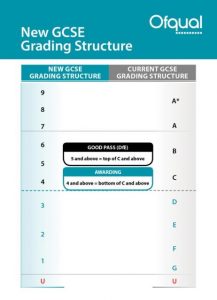
There are several differences to the new GCSEs. Aside from the new grading system, they’re harder, require students to learn the whole curriculum for the end exams, need students to apply their knowledge to problems and remember quotes, technical terms and formulae. This needs a different set of skills from the old GCSEs.
Memory and retention
The new GCSEs require students to use the correct technical vocabulary for the subject, as well as remembering quotes and formulae. A mark would be awarded for correctly using the term osmosis or reacting, whereas more general terms such as mixing, combining would not score. Fomulae for maths and science equations (such as an area of a circle) are no longer provided, so students need to learn these by heart. Quotes from books must also be learnt verbatim for English and history. This requires students to have strategies and study skills that will help them commit these elements to memory.
Resilience and repetition
The new exams have end exams which tests all the knowledge learnt across the whole GCSE course. Previously, many subjects had end of unit tests – several tests across the year testing a specific block of learning, which required less information to be learnt for each test. This means that students are expected to know topics that they learnt in Sept of year 10 as well as those taught just before the exam. This approach also expects that students will be able to use and apply their knowledge across topics in one problem, so a question may require students to demonstrate a knowledge of trigonometry and ratio within one question. Students need to have the discipline and techniques to ensure that they’re revisiting and revising topics as they progress through the curriculum.
More advanced skills
Without doubt, the new exams are harder. There is content in the higher maths tier that was previously in the A level syllabus and topics in the foundation tier that were in the higher tier of the old GCSEs. For the new English GCSE, students are expected to be able to discuss why the author has used certain techniques – this is a completely new skill to students, never tested before. Understanding the historical context of books studied is expected to be at a higher level than previously needed. All these require students to be able to take on board this higher level of thinking and analysis.
Applying the knowledge
Learning the topics well, however, certainly is not enough – the new GCSEs require students to demonstrate that they can apply their knowledge to problems set in the questions. Students are expected to be able to discuss why Priestley set An Inspector Calls before the first world war, when it was written after and how his political viewpoint informed his writing. Maths students are needed to be able to apply the fomulae that they’ve learnt to worded problems, such as Calculate the height of a building, given various angles and distances, without explicitly being told to use trigonometry. Science students need to demonstrate how science applies to real-life issues such as the environment. This is a step on and above from students learning and recalling key facts.
How can I help my child?
There are several key areas that can help your child succeed at the new GCSEs. Firstly, really good subject knowledge is absolutely key – encourage your kids to do their homework to ensure understanding of topics and take advantage of any after-school or lunchtime drop-in sessions. Relearning and revisiting of a topic – essentially making revision notes can become a great resource to refresh learning and ensure topics are not forgotten. Look at techniques for committing quotes, formuale and technical vocab to memory – whatever works for your child – mind mapping, revision cards etc. Reading around the topic, taking full advantage of any supplementary materials from school and practice papers can help with applying the knowledge. There’s a lot to fit in, so encourage and help your kids to start with some of these techniques early.
Would a tutor help?
At Tutor My Kids, our tutors in Ely, Cambridge, Newmarket, St Ives and Huntingdon, support students in many ways, but almost always include subject knowledge, help to apply that knowledge and study skills. For more info on GCSE exams and tuition in Cambridgeshire, please click the link, email Rachel or call her on 01223 858421 for an informal chat.








